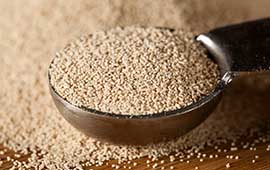Fodder yeast has the form of a special biomass, which is produced on the basis of substrates of plant and non-plant origin.
For this, waste from cellulose and starch production, as well as petroleum fractions, can be used. This product is used as feed for agricultural animals, as well as fur animals, birds and fish. In addition, wholesale deliveries of this product are necessary for the production of compound feed. 100 units of this feed contains 8.5 kg of protein, 60 kg of carbohydrates and 5 kg of fat.
By the way, there are several types of this yeast at once:
- Hydrolytic – needed for growing yeast from wood and agricultural residues such as sawdust, shavings or straw. Hydrolysis requires high temperatures and special acids, thanks to which fiber is converted into carbohydrates, which are needed as a nutrient medium.
- Classic fodder tremors are obtained when grown on sulfite-alcohol stillage.
- The protein-vitamin complex is cultivated from the remnants of the processing of non-plant material – methanol or natural gas.
What is needed for the supply of feed yeast to the EU
In order to import this product to European countries, it is necessary, first of all, to confirm the quality of the product with the help of certificates. In addition, all products must undergo laboratory control and have complet accompanying documentation. Also, farmers need to take into account the requirements for logistics and customs control in various EU countries. In order for European states to agree to buy these products in bulk, you should carefully study all the requirements for supplies, or contact experienced specialists who will help organize this process in accordance with the proposed rules.
Features of import of feed yeast
It should be noted that feed yeast was widespread in the USSR in the 1960s. At that time, this product was actively included in feed for poultry and animals, but later production was significantly reduced due to hygienic and environmental problems. In addition, studies have shown that this product has a negative impact on the health of poultry and animals, due to which interest in it has decreased. That is why at the moment yeast is used more as an additive, but does not make it the basis of the diet. This also affects the number of exports of these products to European countries. At the moment, the following doses of this supplement are recommended for farm animals:
- Cattle – 500 g
- Calves – up to 300 g
- Pigs – up to 300 gr
- Sheep – up to 50 gr
- For poultry – up to 5 gr






